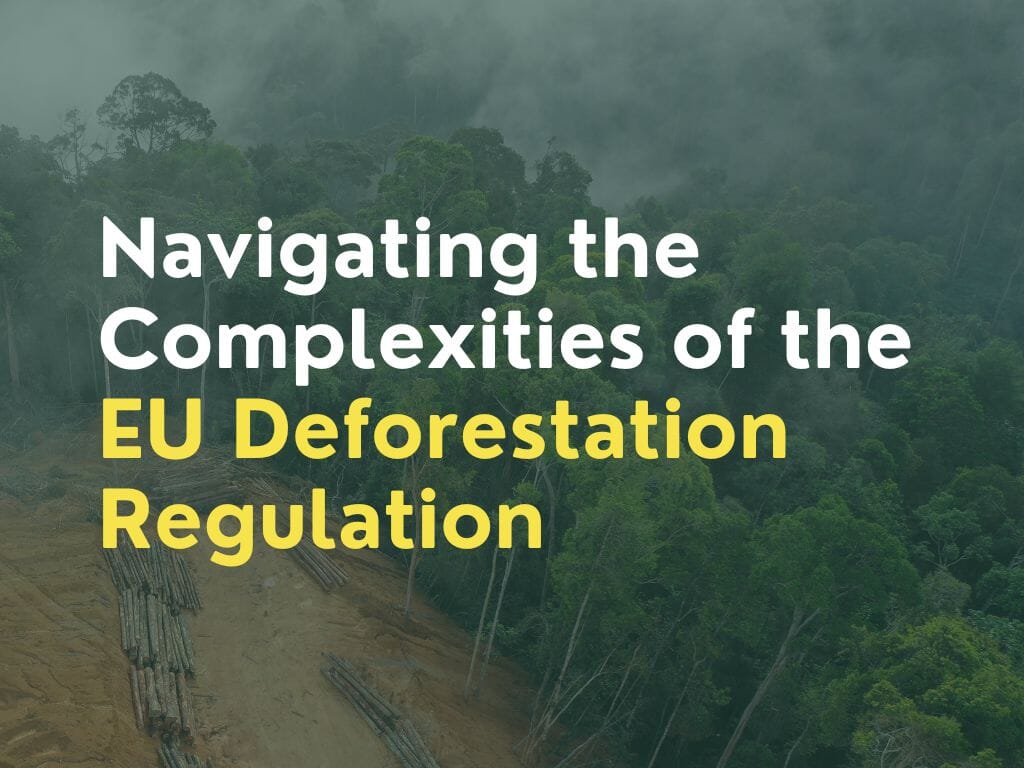
Navigating the Complexities of the EU Deforestation Regulation: TDi Sustainability Offers Expert Insights
From small coffee shops to supermarket giants, and artisan garment makers to big brand fashion names - tens of thousands of companies will be affected by the EU Deforestation Regulation. Understanding its implications is essential for businesses worldwide.
The EU Commission recently proposed to delay the implementation of the EU Deforestation Regulation (EUDR) by one year. While TDi Sustainability is closely monitoring these developments to see if the proposed delay will be approved, we emphasise that regardless of the timeline, businesses should use this period wisely to prepare for the upcoming requirements. Whether the regulation is implemented as originally scheduled or delayed, TDi is ready to support companies in ensuring their compliance and sustainability practices are in place.
By imposing stringent rules and penalties around the import and export of products linked to deforestation into and from the EU, it is hoped that the regulation will significantly reduce global deforestation leading to the loss of habitat and biodiversity, reduce greenhouse gas emissions, protect the rights of Indigenous peoples, protect soils and biodiversity hotspots, and ensure landscapes are not degraded
The EUDR will target seven key commodities and their derivatives: cattle, cocoa, coffee, oil palm, rubber, soya, and wood. These commodities are significant drivers of deforestation, with EU consumption playing a major role. Between 1990 and 2008, the EU accounted for one-third of global deforestation-related imports. The use of these materials is widespread and affects a diverse range of industries, from construction to cosmetics, cafes and restaurants to automotive manufacturers. The impact extends to supermarkets, luxury goods, fashion, chemical companies, pharmaceuticals, and furniture manufacturers and retailers. FMCG (Fast-Moving Consumer Goods) retailers and manufacturers, food and drink manufacturers, food retailers, and the investment and finance sector are also affected. TDis new inherent risk tool with risks to deforestation for each country has been highlighted by TDi analysts and is a good place to start to ensure prioritisation of next steps.
TDi Sustainability is a global sustainability consultancy whose responsible sourcing consultants can help you understand the impact of the EUDR on your business once it is implemented. TDi recently hosted a panel of experts to discuss the impact of the regulation, featuring James Hollins, Head of Data and Due Diligence, Zandi Moyo, Senior ESG Analyst, and Sunil Abeyasekera, ESG Consultant. The webinar, which can be viewed here provided critical insights into the EUDR's scope, requirements, and implications for global supply chains.
The panel highlighted the complex interconnections between deforestation and other environmental and social issues – emphasising the need for companies to address a wide range of challenges in their supply chains. “While deforestation and forest degradation are the key ESG risks addressed by the EUDR, it is important to pay attention to other ESG issues associated with deforestation as well,” Zandi Moyo says. “And that's because deforestation can have far reaching impacts on the environment and people destroying ecosystems that are vital to wildlife and livelihoods, with linkages to biodiversity loss, degradation of ecosystems, climate change and disruption to local and indigenous communities, and some of these ESG issues can also be used as indicators of deforestation, such as biodiversity loss.”
James Hollins stressed the requirements under the Regulation for extensive data collection to ensure products are deforestation-free and compliant with local laws. “This includes precise geolocation data” explains James, “and there are specific requirements for companies of different sizes – demonstrating the regulation’s commitment to traceability and accountability.”
Overall, the panel advocated for a landscape-scale approach to reducing deforestation, outlining strategies that companies can take to go beyond the basic requirements for compliance with the regulation and take a holistic approach. Sunil Abeyasekera explains “This approach encourages collaboration with stakeholders to tackle the root causes of deforestation and implement comprehensive interventions, offering a broader perspective on deforestation drivers and solutions.”
As the EUDR's implementation continues to approach, businesses must act proactively to meet its stringent requirements. This involves investing in robust data management systems, conducting thorough risk assessments and risk mitigation approaches and fostering transparent supplier relationships. Therefore, the TDi team advocated for a strategic, holistic approach to EUDR compliance, recommending risk prioritisation using a double materiality approach and detailed sub-national assessments.
TDi Sustainability's insights can offer businesses a deeper insight into navigating the EUDR's complexities. As compliance deadlines near, companies are urged to leverage these insights to develop effective strategies, contributing to global efforts to combat deforestation. For more information on the EU Deforestation Regulation and its business implications, contact TDi Sustainability.
For more information about the EU Deforestation Regulation, download the EUDR Guidebook.
The EUDR update | November 2024
On 14 November 2024, the EU Parliament approved the EU's proposal to delay the implementation of the EU Deforestation Regulation by one year, as well as a package of amendments to the Regulation.
In the latest episode of TDi's podcast series, Suits and Boots, TDi ESG Analyst, Sunil Abeyasekera looks at what these changes, and the delay mean for businesses across the world. He examines the impact of the delay both on companies that have already prepared for the Regulation, and those that are at an early stage in their readiness. He outlines what needs to be done over the next year to meet the new deadlines, and how businesses should prioritise action.